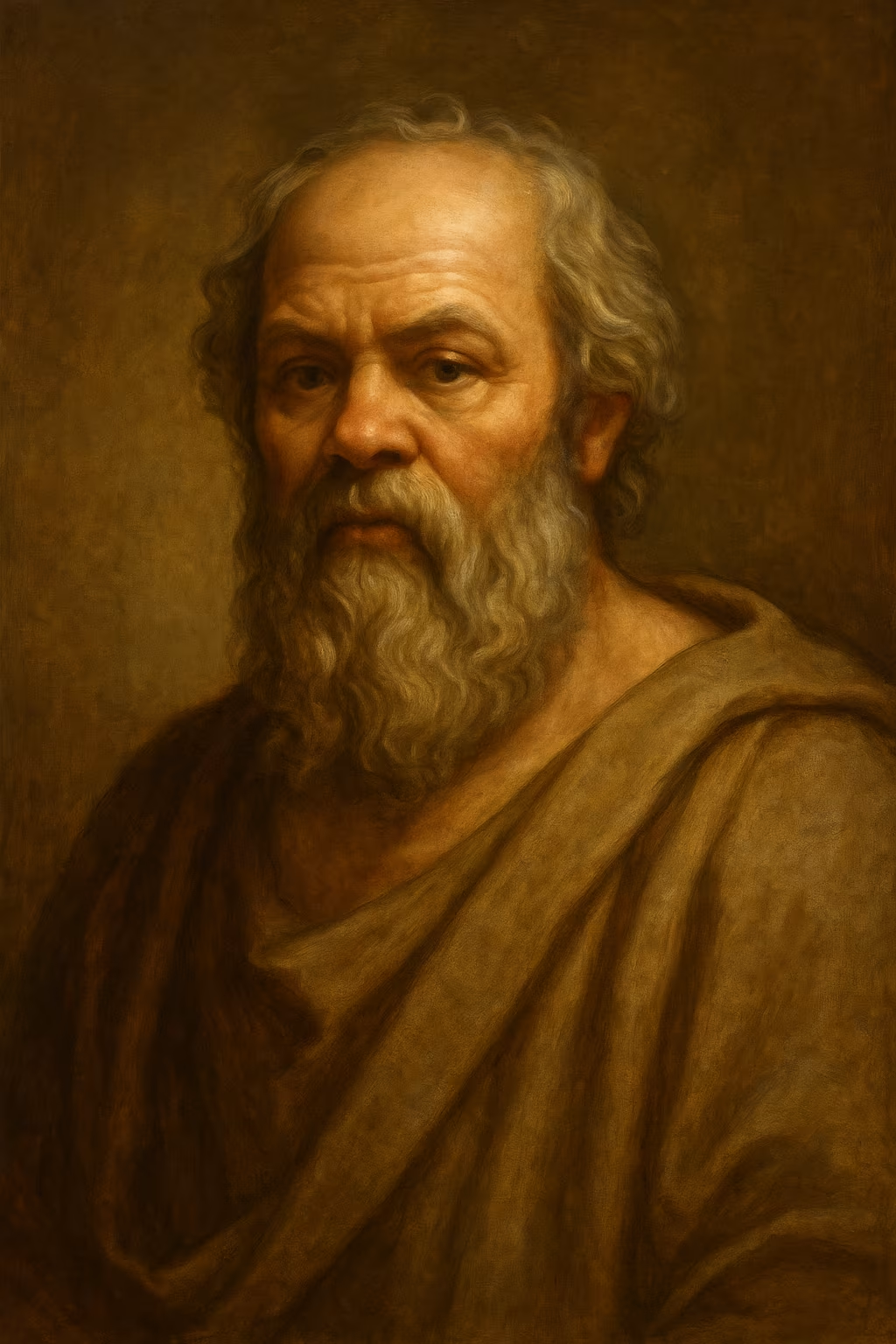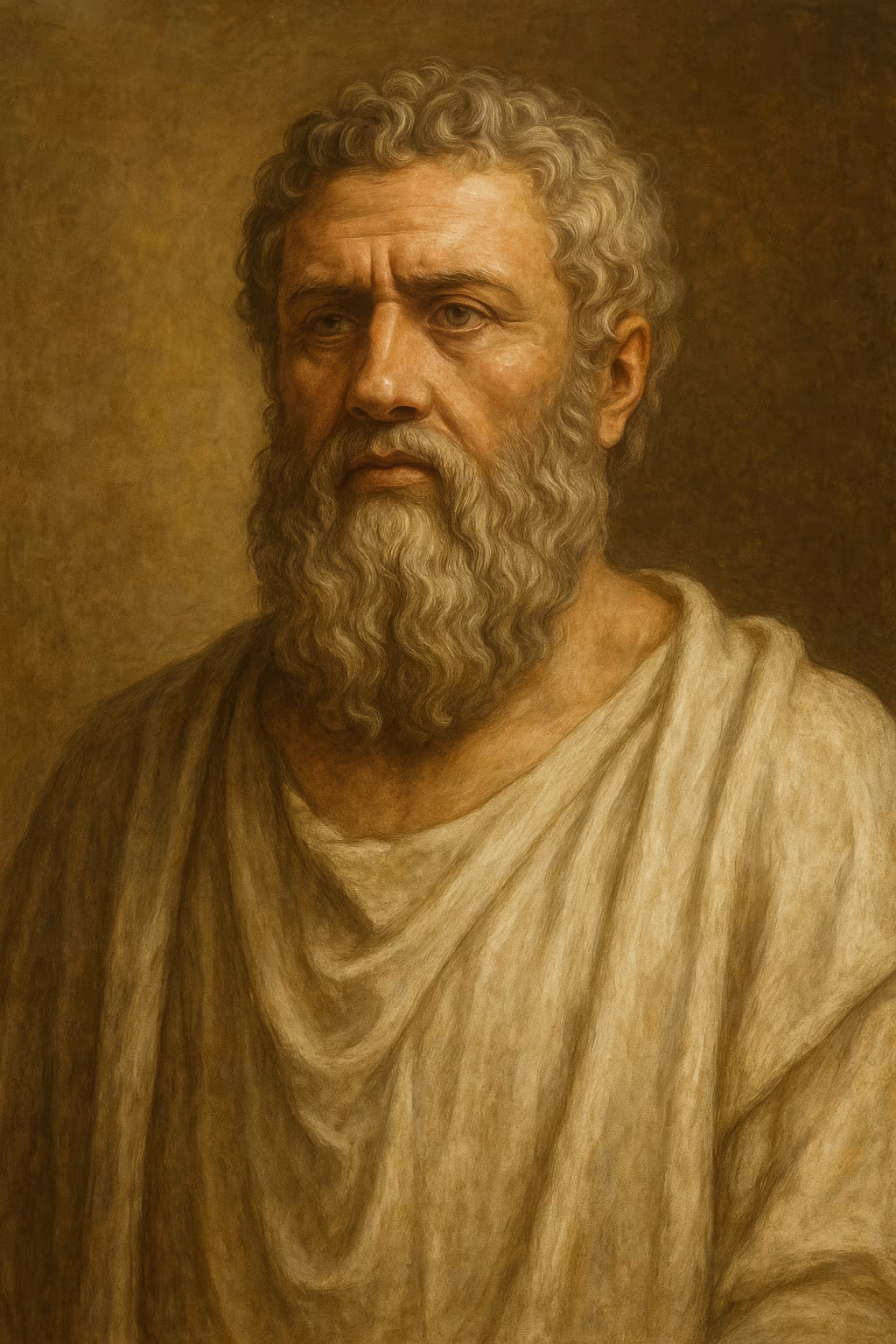Socrates (c. 470 – 399 BCE)
Quick Summary
Socrates (c. 470 – 399 BCE) was a philosopher and major figure in history. Born in Deme of Alopece (according to Plato), Athens, Classical Greece, Socrates left a lasting impact through Formulated the maieutic method of dialectic inquiry.

Birth
471 BC Deme of Alopece (according to Plato), Athens, Classical Greece
Death
400 BC Athens, prison of the Heliaia, Classical Greece
Nationality
Athenian
Occupations
Complete Biography
Origins And Childhood
Socrates was born in democratic Athens shortly after the Persian Wars, probably in the deme of Alopece. Ancient testimonies describe his father Sophroniscus as a stone mason and his mother Phaenarete as a midwife. This artisan background shaped his later claim to practice a ‘maieutic’—helping minds give birth to ideas. Like other Athenian boys, he learned gymnastics, music, poetry, and civic rituals while Athens rebuilt its temples and asserted maritime power.
Military Service
As a citizen, Socrates served as a hoplite in key Peloponnesian War campaigns. Accounts in Plato’s Symposium and Xenophon’s Symposium praise his endurance at Potidaea (432 BCE), his composure during the retreat from Delium (424 BCE), and his presence at Amphipolis (422 BCE). These experiences reinforced his authority when speaking about courage and self-control.
Civic Life And Family
Socrates married Xanthippe and fathered three sons, according to Xenophon. Despite comic portrayals, his household appears modest. He served briefly on the Council of Five Hundred in 406 BCE and resisted illegal orders during the trial of the Arginusae generals, demonstrating commitment to lawful justice over popular pressure. His poverty stemmed from refusing sophistic fees and embracing an austere lifestyle supported by friends.
Socratic Method
Unlike itinerant sophists, Socrates charged no tuition and professed ignorance. His method—the elenchus—involved persistent questioning to test definitions of moral concepts such as piety (Euthyphro), courage (Laches), justice (Republic and Gorgias), and temperance (Charmides). By exposing contradictions, he urged interlocutors toward universal definitions and moral conversion. The Delphic oracle’s declaration that no one was wiser than Socrates prompted his lifelong mission to examine himself and others.
Circle And Followers
Socrates attracted a diverse circle: aristocrats like Alcibiades and Critias, future philosophers such as Plato, Antisthenes, Aristippus, Euclid of Megara, and ordinary citizens. Conversations unfolded in the Agora, gymnasia, and symposia. Disciples later founded major schools—the Academy, Cynicism, Cyrenaicism, and the Megarian tradition—transmitting different aspects of his legacy.
Political Context
His adult life coincided with Athens’s imperial zenith and decline. The Peloponnesian War strained civic unity, while sophists offered rhetorical training for political advancement. Socrates critiqued rhetoric divorced from justice and warned against demagogic manipulation. The political failings of some associates later fueled suspicion toward him.
Trial And Conviction
In 399 BCE, Meletus, Anytus, and Lycon indicted Socrates for impiety and corrupting the youth. Plato’s Apology records his defense: he reminded jurors of his military service, denied teaching impiety, and insisted on obeying his divine mission to philosophize. When asked to propose a penalty, he ironically suggested free meals at the Prytaneum before agreeing to a fine that the jury rejected. By a narrow margin, the dikasts voted for death by hemlock.
Death And Last Dialogues
While awaiting execution until a sacred ship returned from Delos, Socrates continued to converse with friends about the soul and virtue. Plato’s Phaedo narrates his final hours: after bathing and bidding farewell to his family, he calmly drank the hemlock and urged his companions to care for truth and virtue. His serenity exemplified philosophical courage.
Sources And Attestations
Socrates wrote nothing; our evidence comes from three main traditions. Plato’s dialogues present a philosophical portrait, Xenophon’s works provide a pragmatic and pious depiction, and Aristophanes’ comedies satirize him as a sophistic intellectual. Modern historians triangulate these accounts with civic records and sociopolitical context to reconstruct the historical Socrates.
Reception And Legacy
Ancient schools appropriated Socrates in various ways: Cynics admired his austerity, Megarians his logical rigor, Stoics his moral steadfastness. Christian authors later hailed him as a pagan sage. Renaissance humanists revived him as a paragon of wisdom, and Enlightenment thinkers celebrated him as a martyr for reason. Modern pedagogy and critical theory continue to draw on his dialogical method.
Heritage
Socratic inquiry remains foundational for law schools, seminar pedagogy, ethics training, and democratic deliberation. His insistence on self-knowledge and moral clarity influences analytic philosophy, phenomenology, and public discourse alike.
Achievements and Legacy
Major Achievements
- Formulated the maieutic method of dialectic inquiry
- Anchored ethics at the heart of philosophical debate
- Trained a circle whose schools transformed ancient thought
- Modeled intellectual freedom through his trial and death
Historical Legacy
Socrates remains the archetype of the questioning philosopher; his commitment to critical inquiry over political convenience continues to inspire education, ethics, and democratic dialogue worldwide.
Detailed Timeline
Major Events
Birth
Born in the deme of Alopece, Athens
Potidaea campaign
Serves as hoplite during the Peloponnesian War
Battle of Delium
Demonstrates courage during the retreat
Council of Five Hundred
Opposes illegal condemnation of Arginusae generals
Trial
Faces charges of impiety before the Heliaia
Death
Drinks hemlock in prison
Geographic Timeline
Famous Quotes
"Know thyself."
"The unexamined life is not worth living."
"All I know is that I know nothing."
External Links
Frequently Asked Questions
When and where was Socrates born?
He was likely born around 470 BCE in the deme of Alopece near Athens, to the artisan family of Sophroniscus and Phaenarete.
What teaching method did he use?
He practiced the maieutic method—elenchus—asking probing questions that exposed contradictions and guided interlocutors toward clearer definitions.
Why was Socrates condemned?
He was charged with impiety toward the civic gods and with corrupting the youth, allegations tied to his critical stance and influence on young citizens.
What are the primary sources about him?
Plato, Xenophon, and Aristophanes provide the main ancient testimonies, offering philosophical, pragmatic, and satirical perspectives respectively.
How did he influence later philosophy?
He put ethical definitions at the center of philosophy, shaping Platonism, Cynicism, Stoicism, and modern critical pedagogy.
Sources and Bibliography
Primary Sources
- Platon — Apologie de Socrate
- Platon — Phédon
- Platon — Gorgias
- Xénophon — Mémorables
- Xénophon — Apologie de Socrate
- Aristophane — Les Nuées
Secondary Sources
- Gregory Vlastos — Socrates: Ironist and Moral Philosopher ISBN: 9780801497877
- Thomas C. Brickhouse & Nicholas D. Smith — Socrates on Trial ISBN: 9780195119800
- Paul Veyne — Les Grecs ont-ils cru à leurs mythes ? ISBN: 9782213018553
- Pierre Hadot — Qu’est-ce que la philosophie antique ? ISBN: 9782707302742
External References
See Also
Related Figures
Specialized Sites
Batailles de France
Discover battles related to this figure
Dynasties Legacy
Coming soonExplore royal and noble lineages
Timeline France
Coming soonVisualize events on the chronological timeline
